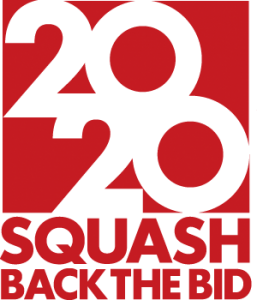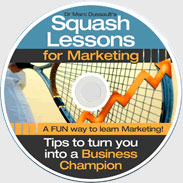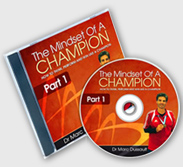I just presented sports psychology principles to squash players at Vancouver’s prestigious Jericho Tennis Club. One of the many excellent questions asked was “With all the books available on the subject, how do you know what to ‘listen’ to as good versus bad advice to avoid confusion”
First, you need a framework to work with – a set of guiding principles that you believe in and that you KNOW work for you. Consider them the corners of a puzzle. One example of a guiding principle is “Positive self talk”, another is “Having an outcome or goal for your performance of development”.
 Within those guiding principles, you start to read and assemble the pieces of the puzzle IF THEY ARE CONGRUENT within the “four corners”.
Within those guiding principles, you start to read and assemble the pieces of the puzzle IF THEY ARE CONGRUENT within the “four corners”.
For example, in squash, there are two schools of thought: (1) you should always try to hit the ball with your FRONT foot in front of you, versus (2) ‘back footing” the ball in certain circumstances.
You need to PICK which one YOU believe works for YOU, then discard, ignore the contradictory suggestions. You MUST make sure you coach(es) are aware of this so they don’t give you conflicting directions!
Dabblers – people who read anything and listen to everyone’s suggestions get quickly confused and dissipate their focus to their detriment they are interested in superficial knowledge.
Knowledge is deep when it concerns the central ideas of a topic or discipline, which are judged to be crucial to it. Deep knowledge involves establishing relatively complex connections to those central concepts. Thin knowledge is shallow or superficial when it is not connected with significant concepts or central ideas of a topic or discipline and is dealt with only in a simplistic or procedural fashion. Knowledge is also shallow when important, central ideas have been trivialised and simplified to an extreme.
It is acknowledged that information and knowledge is extensive and wide-ranging. There is a balance to be achieved between trying to know everything about everything (A Jack of all trades) versus “everything about one thing” (a specialist).
Admittedly, this is not an easy concept to grasp. It’s a skill and aptitude that I developed over 10+ years when I was also confused by all the conflicting information I was reading in all the books I read. (I am a speed reader and have read over 1,000 business books and over 100 on mental toughness and sports psychology alone).
Here are some steps you can start to use to CONCENTRATE YOUR FOCUS when it comes to your learning and development.
- Establish your guiding principles (the 4 corners of the puzzle)
- When something new “comes up” – determine if it fits “within the puzzle”. I suggest you stick to what you are doing until someone gives you a COMPELLING reason to consider switching.
- If it sounds promising (in that you think it could help or assist you to achieve your goals or outcomes), then give that option a MINIMAL assessment and if that MINIMAL assessment provides a positive outcome only then should you consider it. Otherwise, I ignore it.
- Most people assess, evaluate to death each and every idea they hear about and most turn out NOT to be worth it. By NOT getting distracted, your concentration of FOCUS will increase instead of dissipating. It’s hard to explain, but if it does not serve you to ACHIEVE YOUR GOAL, don’t let the distraction “in” – if you do ADD it to your arsenal, it has to ADD to your EXISTING framework of strategies. It needs to “FIT INTO” the puzzle so-to-speak if it doesn’t, discard it and wait for the next one – WHICH WILL COME AROUND.
The best advice I can give you is to make sure you have a coach or mentor to assist you in your quest. There is no better way to achieve your ultimate outcome.





0 Responses to “Concentration Of Focus”